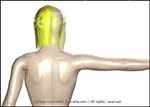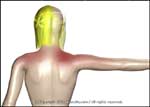 | |
Burns, second degree,
and third degree burns
|
 |

Normal |

Abnormal |
|
|
- Burns describe injury to various layers of the skin. The skin is an important organ that protects us against infections (from the "outside world"), Dehydration (water
loss), and overheating.
- First-degree Burns affect the top layer (epidermis) of the skin (i.e., least severe injury); second-degree Burns affect both the outer and the underlying layer (dermis) of skin; third-degree Burns (most severe) affect
all layers, including the deep layer of skin. The
dermis is where the hair follicles, blood vessels, nerve
endings (involved with sensation, temperature, and pain
reception), and sweat glands reside. Underneath the
dermis lie the muscles, nerves, larger blood vessels, and
bones. The extent of damage to the skin depends on the
type, size, and severity of the burn.
- Direct heat such as hot steam,
fire, explosions, hot water, friction (rubbing action
produces heat), radiation, sunrays, other heated objects or
liquids.
- Chemicals such as sulfuric acid can
burn the skin.
- Electricity (especially alternating
currents) may also burn the skin.
- Inhalation of fumes, smoke, or steam can cause Burns.
- In children and the elderly, Burns may be a sign of physical abuse, or diseases such as Alzheimer's.
|
 |
- First degree -- mild, with reddened skin, pain, and swelling
- Second degree -- pain, swelling, red skin with blisters (fluid-filled sac)
- Third degree -- the skin may be charred and blackened, but often painless (due to underlying nerve destruction).
- Inhalation Burns -- there may be burned lips, mouth, and throat.
- Face (eyebrows, nose hairs, eyelashes, scalp hair) may be reddened or burned.
- Patient may have difficulty breathing or coughing.
- With severe Burns the patient will be in Shock (falling blood pressure, severe fluid and blood loss) and possibly suffer symptoms of hysteria/dementia.
- Electrical Burns with high voltage
(>1000 V) or high amperage commonly damage multiple organ systems, and may be associated with cardiac arrest.
- Burns are at increased risk of being infected (as with pseudomonas bacteria).
|
 |
- History of exposure, symptoms, occupation, illnesses, allergies, medications, and personal habits
- Medical exam by physician will reveal the skin changes of Burns.
- Inhalation victims may require chest X-Rays.
- Severe Burns require admission to a hospital emergency room or trauma/burn center for further evaluation of the patient's vital signs (temperature, pulse, blood pressure, respirations), oxygen levels, blood chemistries, and overall assessment of damage to internal organs and skin.
|
 |
- Smokers -- fall asleep while smoking
- Arson victims
- Automobile accidents
- Lightning victims
- Children
- Elderly
- Fire fighters
- Laboratory workers
- Miners exposed to toxic fumes and explosives
- Military personnel
- Electricians
- Sunbathers
- Radiation exposure
|
 |
- Depends on severity, size and type of burn
- Minor Burns --
- Reassurance
- Protect the burn by covering it with sterile gauze or bandage (avoid friction or pressure)
- Soaking in cool water may help (not in cold climate)
- Pain management with over-the-counter medications (Tylenol, aspirin, etc.)
- If the skin is not healing well in a few days, or the burn is greater than 3 cm in diameter, or the burn is over the face -- contact a physician for advice.
- If the patient appears sick and presents changes in alertness, confusion, fever, severe pain, or loss of consciousness -- seek immediate emergency medical treatment, regardless of the type of the burn.
- Even small Burns that result in an open sore, loss of skin layers, or ulceration should be discussed with (and possibly seen by) a physician. Often an anti-infective cream, Silvadene, is prescribed.
- A Tetanus shot may be
required if the patient's immunization's are not up-to-date (Tetanus boosters are usually given every 7-10 years).
- If you suspect an inhalation burn, seek immediate emergency medical treatment.
- In all cases, keep the burn site
clean and do not apply ointments (unless prescribed), creams, butter, toothpaste, or any household remedies until you check with your physician.
- Do not burst the blisters or rub the skin.
- If the burn is severe, do not soak it in ice water.
- If the burn is due to exposure to chemicals, radiation, electrocution, inhalation, or the patient is in Shock -- call 911.
- Major injuries need to be seen by a physician immediately.
- If someone is on fire -- don't panic. Douse with water if available, wrap in a thick wool or cotton blanket, rug, or coat, roll them on the ground to put out the flame (i.e., "stop, drop, and roll"), and call 911.
- Do not obstruct the airway -- make sure the patient can breathe.
- In severe burn injuries, do not give anything by mouth and wait for trained professionals to arrive.
- Follow and learn the procedures for Burns if you work in a hazardous occupation
|
 |
- For minor Burns follow the steps above or contact your doctor.
- For severe Burns call 911.
|
| | |

